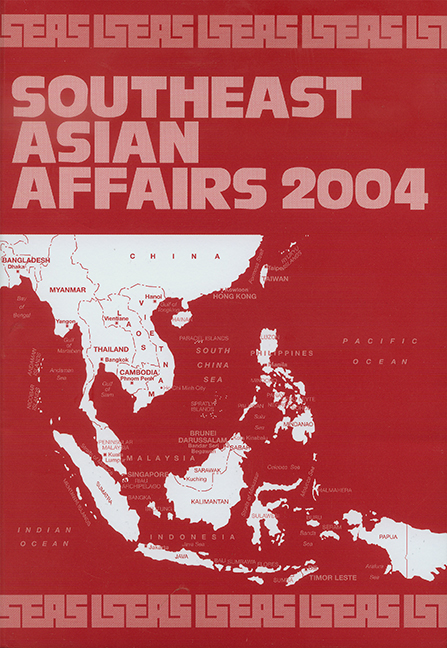Book contents
- Frontmatter
- FOREWORD
- Contents
- INTRODUCTION
- THE REGION
- ASEAN in 2003: Adversity and Response
- Southeast Asia's Economic Performance: Achievements and Challenges
- Southeast Asia–China Relations: Dialectics of “Hedging” and “Counter-Hedging”
- Terrorism in Southeast Asia: The Ideological and Political Dimensions
- BRUNEI DARUSSALAM
- CAMBODIA
- INDONESIA
- LAOS
- MALAYSIA
- MYANMAR
- THE PHILIPPINES
- SINGAPORE
- THAILAND
- TIMOR LESTE
- VIETNAM
ASEAN in 2003: Adversity and Response
from THE REGION
Published online by Cambridge University Press: 21 October 2015
- Frontmatter
- FOREWORD
- Contents
- INTRODUCTION
- THE REGION
- ASEAN in 2003: Adversity and Response
- Southeast Asia's Economic Performance: Achievements and Challenges
- Southeast Asia–China Relations: Dialectics of “Hedging” and “Counter-Hedging”
- Terrorism in Southeast Asia: The Ideological and Political Dimensions
- BRUNEI DARUSSALAM
- CAMBODIA
- INDONESIA
- LAOS
- MALAYSIA
- MYANMAR
- THE PHILIPPINES
- SINGAPORE
- THAILAND
- TIMOR LESTE
- VIETNAM
Summary
Since the Asian economic crisis of 1997–78 the usefulness of the Association of Southeast Asian Nations (ASEAN) and, indeed, even the need for it to exist at all have been hotly debated. Both the Asian economic crisis and the expansion of ASEAN to include Vietnam in 1995, Myanmar and Laos in 1997, and Cambodia in 1999 exposed ASEAN's weaknesses and created tensions, which undermined ASEAN's credibility both within Southeast Asia and internationally. During the first few months of 2003, ASEAN's value to its members was further questioned as a series of events overtook the region. The fall-out from the 12 October 2002 Bali bombings was still being felt and there appeared to be limited regional co-operation in order to confront the terrorist threat. The attack on Iraq by the American and British forces further divided ASEAN. And then came the outbreak of Severe Acute Respiratory Syndrome (SARS), which threatened to bring the economy of the region, which was already faltering because of problems with the U.S. and EU economies, to its knees. The year did not start well.
However, by the end of 2003 ASEAN had once again proven of value to its members. The turnaround in ASEAN's fortunes owes much to the new Chinese leadership, which has given priority to cultivating links to its neighbours in Southeast Asia. But ASEAN members themselves also demonstrated that they are willing to develop policies aimed at strengthening the organization. The signing of the ASEAN Concord II, at the Bali summit in October 2003, paves the way for the ASEAN members not only to develop a more integrated regional community but also to encourage neighbouring countries to adopt many of the Association's goals and values. In light of all the challenges that preoccupied the ASEAN members during 2003, the year ended on a much more positive note than it began. Indeed, by the end of 2003, despite the problems that remained, ASEAN was once again starting to provide distinct benefits to its members.
- Type
- Chapter
- Information
- Southeast Asian Affairs 2004 , pp. 3 - 17Publisher: ISEAS–Yusof Ishak InstitutePrint publication year: 2004



